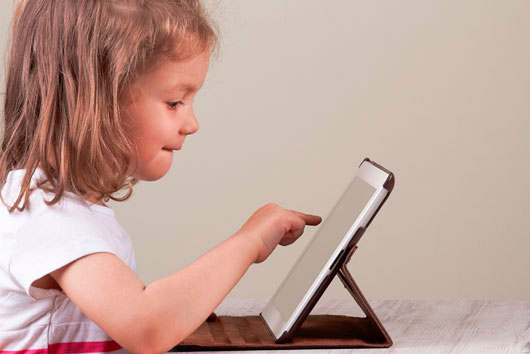
Time spent staring into a screen is higher than ever for children, despite the ongoing recommendation of the American Academy of Pediatrics that TV and video-gaming time be limited, according to an article in the New York Times. Apparently, children that spend too much time on the screen are less likely to interact with people, which may cause speech delays. Kids who rely on electronics for fun and learning are more sedentary and prone to overeating. They are also less socially adept. Now, the AAP is recommending that children under 2 not engage in any form of screen time whatsoever.
Perhaps the more interesting aspect is the discovery that families with incomes above $75,000 a year are more likely to download apps specifically for their children than those earning under $30,000 a year, resulting in an “app gap.” Some lower income families, who do not own iPods, iPads or iPhones don’t even know what an “app” is, according to the “Zero to Eight: Children’s Media Use in America,” a survey conducted by Common Sense Media. This app gap is striking, in that only 14 percent of lower-income parents reported downloading new apps for their children, while almost half or 47 percent of upper-income parents have. On the other hand, these families are more likely to have a TV in the kids’ room than their better-off counterparts.
APPS, APPS EVERYWHERE
There are TV commercials that encourage the use of smart phones to keep your toddler quiet at the grocery store, and endless online lists of apps meant to entertain your kids and prevent meltdowns in public. Others promote apps to educate your child [http://www.ikidapps.com/] in everything from money to languages, and many apps are rated for children between one and two years of age. Is it any wonder the survey findings showed that among 0-8-year-olds:
• Half or 52 percent have access to a new mobile device, such as a smartphone or iPad..
• More than one-third or 38 percent have used such devices. That percentage increases, the older the child, with usage at 52 percent among 5-8 year-olds.
• One in 10 or 11 percent use a smartphone, video device such as an iPod or iPad to place games, watch videos or use other apps for an average of 43 minutes a day.
APPS CAN’T REPLACE HUMAN INTERACTION
Given our multi-tasking harried lifestyle, many parents resort to TVs and electronic gadgets, especially their own iPhones and iPads, to entertain their children. But, if you do not believe in relying exclusively on technology to entertain and teach your kids, or simply cannot afford it, don’t worry. An article on ABC news quotes experts, as saying that good old personal interaction with your child and giving her the opportunity to experience the world through the tried and true five senses will teach her far more about life than any app can.











